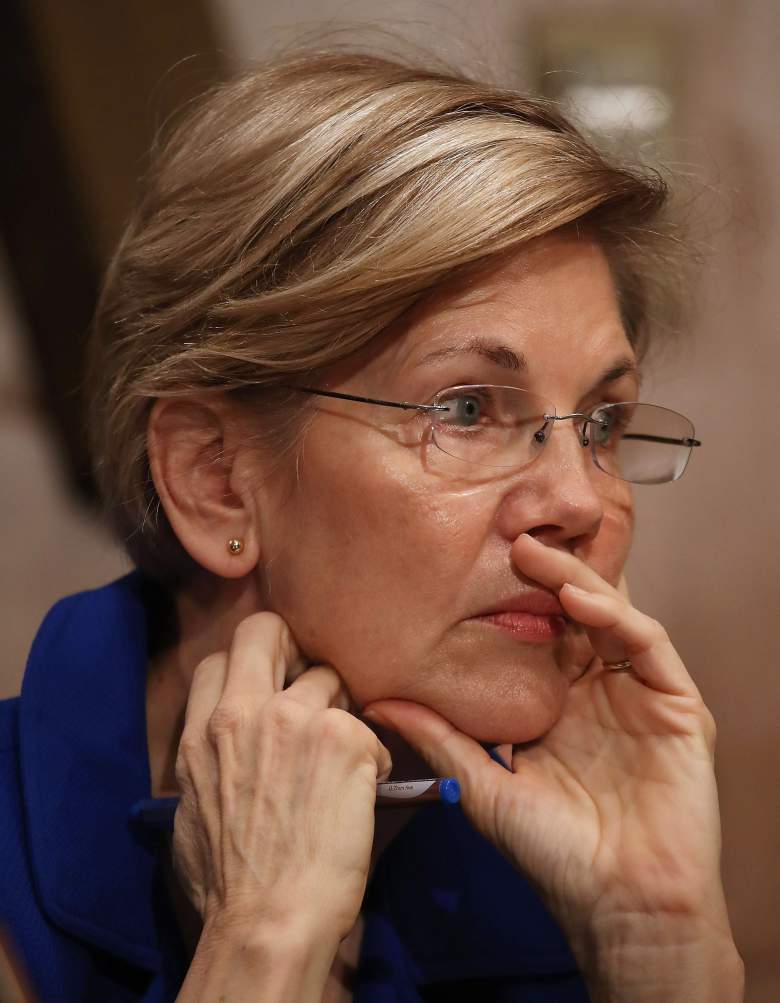
Getty Elizabeth Warren and Donald Trump
Elizabeth Warren is clearly a reader of Mother Jones magazine. On Thursday, Mother Jones published a piece about David Bernhardt, the second-in-command at the Department of the Interior. Mother Jones called Bernhardt an “ex-oil lobbyist straight out of the swamp.” Warren calls him “the ultimate swamp creature.”
Bernhardt has been getting a little extra attention in the media lately because of rumors that Trump may be eyeing his boss, Ryan Zinke, to take over as ambassador to the United Nations after Nikki Haley leaves at the end of the year. If that happens, then Bernhardt would likely take over Zinke’s position as head of the Interior Department.
Bernhardt was confirmed by the Senate in 2017 to take over the number two position in the Department of the Interior, the agency charged with looking after the country’s natural resources. Republicans like Lisa Murkowski and Cory Gardner praised Bernhardt for his “deep understanding” of land rights issues and for his ability to “balance” the demands of conservation with the demands of the economy.
Murkowski said, at the time, “He understands the management of federal lands … and the balance between conservation and development.”
But environmentalists have criticized Bernhardt for his connections to industry and have said he’s rolled back protections against climate change. These are all the same criticisms that Bernhardt’s boss, Ryan Zinke, faces as well.
Bernhardt Played a Role in Some of the Bush Administration’s Controversial Environmental Moves
Back in 2001, shortly after George W Bush took over the presidency, Bernhardt accepted a job as a lawyer for the Interior Department. He eventually rose to become the top lawyer in the department, overseeing a staff of 500. As a lawyer in the department, Bernhardt helped create the legal justifications for some of the Bush administration’s controversial moves. This included the administration’s attempts to open the Arctic National Wildlife Refuge to drilling and to allow snowmobiles in Yellowstone National Park. Bernhardt was also involved in implementing the Energy Policy Act of 2005. Environmentalists have criticized that Act for exempting the fracking industry from certain water regulations.
In 2011, Bernhardt left the Interior Department and went into the private sector. (He later re-joined the government as part of President Trump’s transition team.) Bernhardt took a job as chief of the natural resources law division at Brownstein Hyatt Farber Schreck LLP, a Washington D.C. legal firm which represents California’s Westlands Water District, the largest water district in the US.
Activist Groups Tried to Block Bernhardt’s Appointment at the Interior Department
Bernhardt has been getting a little extra attention in the media lately because of rumors that Trump may be eyeing his boss, Ryan Zinke, to take over as ambassador to the United Nations after Nikki Haley leaves at the end of the year. If that happens, then Bernhardt would likely take over Zinke’s position as head of the Interior Department.
The non-profit watchdog group Campaign for Accountability said that Bernhardt should be investigated for continuing to work as a lobbyist even after joining the Trump transition team. You can read their complaint about Bernhardt here.
A host of other environmentalist groups wrote to the Senate to oppose Bernhardt’s appointment to the Department of the Interior. The groups charged that, after spending years as a lobbbyist, Bernhardt was far too close to industry. The groups wrote, “After spending years lobbying for the oil and gas industry, big agribusiness and water profiteers, Mr. Bernhardt is laden with conflicts of interest that raise serious questions about his ability to act in the public interest. Further, during his tenure as solicitor of the Department of the Interior, the agency’s chief ethics officer, political appointees engaged in ethical lapses and decisions that sacrificed science and the environment to line corporate pockets.”
You can read the full letter here.

